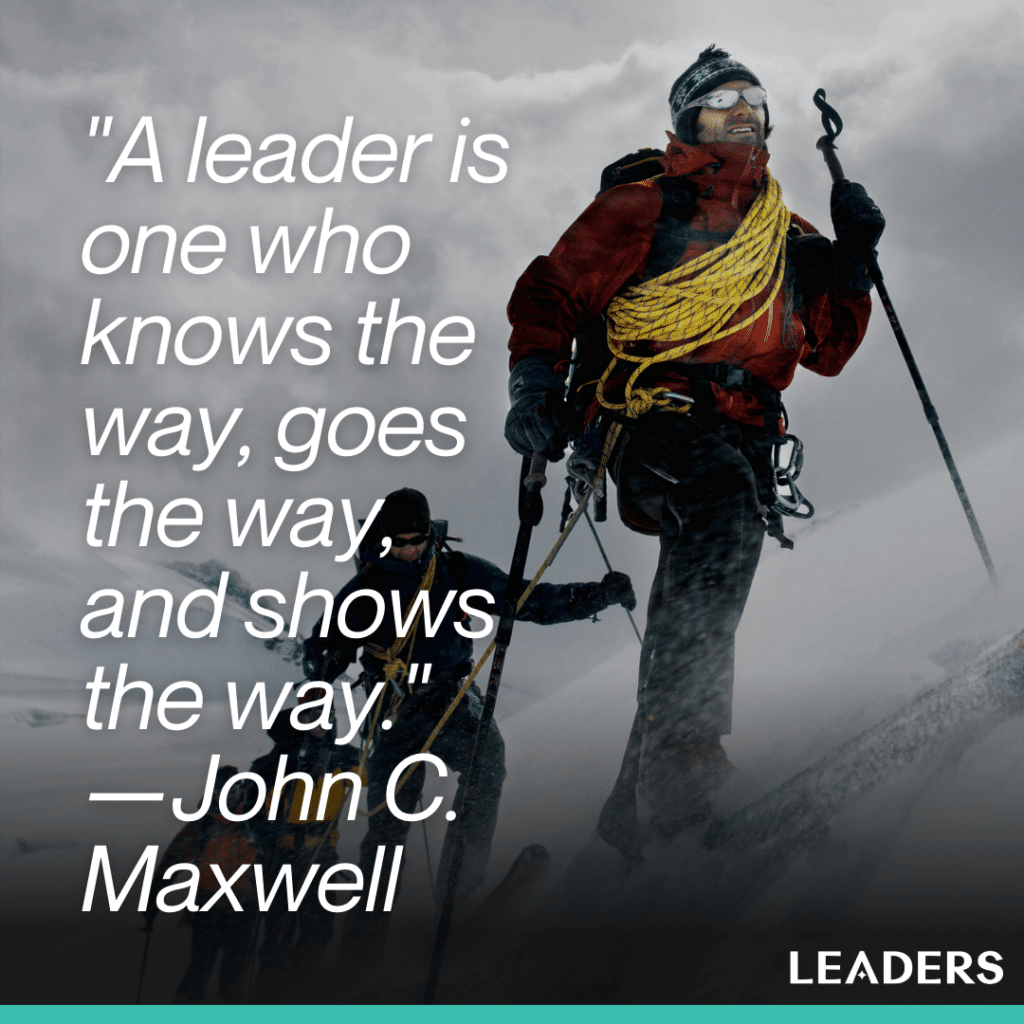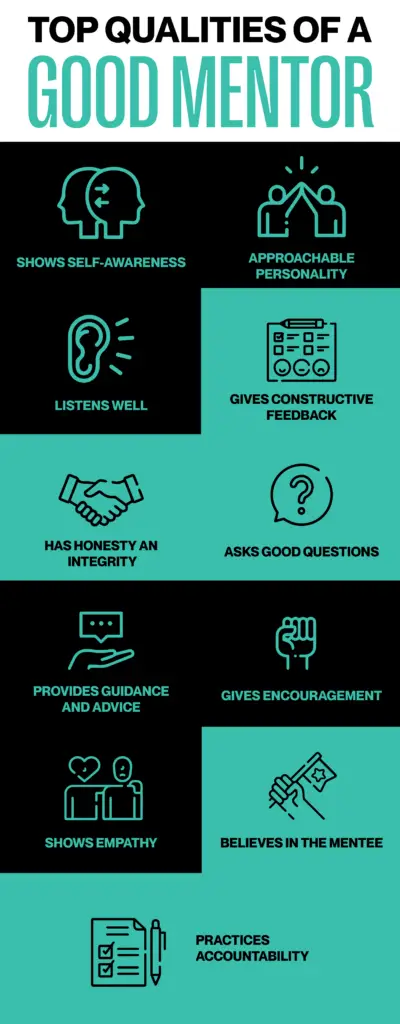If you found yourself in the middle of a large city you’ve never been to with no map, no one would expect you to find your way easily. The same holds true in nearly every aspect of life, including your professional life. What you need is a guide, the type of person who can prepare you for the road ahead. In other words, you need a mentor—an individual that John Maxwell describes as someone who “knows the way, goes the way, and shows the way.”
To understand the importance a mentor can play in business success, learn about what to look for and how to find a mentor who will guide you to your desired destination.
Key Takeaways
- Mentors act as guides, helping mentees find solutions without directly giving them.
- Working with a mentor can help you limit mistakes and find further professional success.
- Mentors provide an open environment of trust where people can maximize their abilities and talents.
- Mentorships work best when the mentee has specific goals they want to work on.
- The mentoring relationship is equally beneficial to a mentor and a mentee alike.
What Is a Mentor?
“A mentor takes people where they want to go. A great mentor takes people where they don’t necessarily want to go but ought to be.”
Rosalynn Carter
A mentor is a trusted guide with valuable experience that allows them to act as an advisor to mentees. With their unique knowledge, a mentor helps map out what lies ahead, preparing the mentee for the future. Additionally, they introduce challenges to overcome and goals to reach for, helping their mentee stretch and strengthen their abilities.
A mentor imparts wisdom and understanding while influencing the mentee to become the best that they can be. The frequency with which they meet with the mentee can vary. Some may choose a weekly meeting, while others may follow up every couple of months. One of the things that makes a mentor an invaluable companion is their availability. A mentee should be able to contact their mentor at any moment when they need help.
Mentorship can be a paid or unpaid service. Some mentors certainly do receive compensation due to the amount of work involved. Many companies feature mentoring programs where senior employees help to mentor newcomers as part of their job. However, not every mentor receives payment. Many people volunteer their services from an inherent desire to share what they know and to help others succeed.
Benefits of Mentorship
“A mentor empowers a person to see a possible future, and believe it can be obtained.”
Shawn Hitchcock
As a mentee, you have much to gain when working with a mentor. Besides the clear confidence boost you have when an experienced guide is showing you the way, there are other benefits worth talking about. The following are just part of a short list of items you’ll likely experience when a mentor helps you out.
Limit Mistake-Making
People rarely find success without dealing with their own share of failures. A mentor can help guide people on a path that features fewer dead ends. When a mentor provides insight through experience, mentees can more easily avoid the bad decision-making that causes mistakes. In fact, a mentor can provide advice that helps business leaders make much better decisions, leading to more company success. In a study featuring 45 CEOs with mentors, researchers at Harvard Business Review found that “84 percent said as a result [of mentorship], they have avoided costly mistakes and became proficient in their roles faster. 69 percent said mentors helped them make better decisions, and 71 percent were certain company performance improved.”
Feel Connected to an Inner Circle
A good mentor also enhances a mentee’s professional network. This includes making important introductions to valuable contacts. When starting from the ground up, many entrepreneurs likely don’t have the same professional associations as their guides do. Often serving as an agent of connection, a mentor provides opportunities to bring people together. This type of support offers business owners and leaders a remarkable resource for expanding their network. Furthermore, these introductions can create connections to great employees, investors, partnerships, and clients.
Secure Emotional Support
The mentoring relationship also provides refuge during emotional distress and challenging times. Leaders often need a safe place to discuss the rewarding but strenuous journey of leading others. Whether acting as a sounding board or giving advice on serious decisions, a mentor has a powerful effect on the words and actions of mentees. In effect, mentors help people manage stressors and lead from a place of high emotional intelligence.
Experience More Professional Success
Having a mentor often leads to more success in your professional life. According to a study from Gartner, people who had a mentor were five times more likely to receive a promotion. A mentor can help people develop the skills needed to make advancements in their careers. They can also identify areas where mentees need to focus, leading to more satisfying results professionally.
Get Helpful Feedback at Every Moment
People want to know if they’re on the right track and making the right decisions. A mentor can provide that feedback with insightful advice around every turn. Without that feedback, you may wonder if you’re doing the right thing or if you’re getting effective results that help with your long-term career goals. When a mentor is by your side, you can have the confidence and reassurance that someone is acting as your guide. From marketing yourself to developing your communication skills, the feedback you receive serves as a constant indicator of the direction you’re moving in.

What Are the Duties and Responsibilities of a Mentor?
“The delicate balance of mentoring someone is not creating them in your own image, but giving them the opportunity to create themselves.”
STeven Spielberg
While mentoring relationships can benefit the mentee tremendously, it’s important to understand the purpose of mentorship and the role a mentor plays. The following is just a small sampling of what you can expect your mentor to do.
- Create an environment of trust and comfort
- Provide opportunities for mentees to solve problems they encounter
- Show care and concern when advising a mentee
- Engage in active listening at all times, understanding what mentees say
- Develop a mentee’s skills and abilities according to their own strengths
- Keep personal information confidential
- Direct and guide when needed, but still allow mentees room to experiment
- Be available for help whenever the mentee needs it

The Type of Support a Mentor Doesn’t Provide
While some people may consider a mentor to be the equivalent of a business coach or a life coach, that’s not the role they are meant to play. To strengthen the relationship between mentor and mentee, it’s important to know what types of support a mentor does not provide.
- Mental Health Counseling Services: A mentor isn’t a licensed mental health professional who is able to help people work through psychological problems. All mentees should be aware that while mentors can give good guidance, they do not have the training or education to provide mental health services. If you feel you need that specific type of help, seek out a qualified mental health professional.
- Specific Business Strategies: While a mentor can give advice on how to run a business, they don’t provide specific, detailed strategies. Most mentors do not have access to sensitive business information, such as financials or employee records. Because of this, their advice will be of the general variety, usually with a focus on overall goals rather than strategies and tactics.
- Interpersonal Relationship Advice: Much as with mental health services, a mentor usually does not have the qualifications or expertise to provide help with problems mentees may have in their personal relationships. For example, if a mentee has a rocky relationship with a spouse, the mentor will not have the training to provide further advice beyond general guidance.
- Secretarial Services: An effective mentor can put you in touch with people who can help you in your career. However, a mentor is not a secretary, nor should they be treated as one. While being mentored, don’t expect the mentor to take your calls, fill out your schedule, set up appointments, or manage tasks for you. It is not the responsibility of a mentor to do these things, and it would be a waste of their knowledge and experience if they did.
Frequently Asked Questions About Mentorship
What are the top qualities of a good mentor?
While every mentor is different, you will find the best ones possess some similar characteristics and qualities:
- Shows self-awareness in what they say and do
- Has a kind, approachable personality
- Listens well to everything the mentee says
- Gives helpful, constructive feedback
- Displays honesty and integrity
- Asks questions that get the mentee to think
- Provides guidance and advice but allows the mentee to figure out the solution
- Encourages mentees when they’ve hit a rough patch
- Empathizes with the problems the mentee faces
- Believes in the mentee’s abilities and goals
- Holds mentees accountable for their actions
How should a mentee prepare for working with a mentor?
If on the first day you work with a mentor you simply go up to them and ask for help, you’re going to be disappointed. You need to go to them fully prepared for their instruction. With this in mind, there are several things you can do before that crucial first day.
- First, set goals you want to accomplish. Goal-setting is a skill in itself, so make sure to write your top objectives down. Maybe you want to develop leadership characteristics during the mentorship. The goals you write down should reflect that. Your goals should be ones where you can easily measure your progress. Even if you have trouble articulating what your goals should be, your mentor can help you specify them (as long as you have some idea about what to shoot for).
- Next, write down any problems you’re currently having that you want your mentor to know about. Perhaps you’re worried that you don’t have high emotional intelligence and want to improve. Make sure you tell your mentor right from the start so you can begin working on it.
Ultimately, preparing for mentorship has a lot to do with maximizing a mentor’s time with you. This isn’t the mentor’s full-time job. Every minute spent with them is precious. Prepare yourself mentally and intellectually to receive valuable instruction. Bring materials to take notes or a device to record what they say. You’ll want to reference them often.
How does a person find a mentor?
When looking for mentorship, there are a variety of options you can pursue. Some of them include reaching out to respected colleagues, asking a mutual connection for an introduction, or seeking suggestions from friends and family. Additionally, joining a mastermind is also a great way to discover a mentor. Outside of those options, there are several resources you can use.
Online Resources
- SCORE: SCORE connects small business owners to over 1,200 potential mentors. Participants include both active and retired entrepreneurs who meet in person and online. To find the chapter nearest you, click here.
- Meetup.com: This site organizes local networking events, including those for small business owners, entrepreneurs, and leaders to help people find a mentor. Learn more to see events or join a group.
Social Media
Social networking sites offer tons of free valuable content to people in need of a mentor. LinkedIn connects business professionals to one another through one-on-one invitations. Members can also join various groups started by fellow entrepreneurs and business owners. Likewise, the “Groups” tab on Facebook serves a similar purpose. Users can search for words like “mentor,” “mentorship,” “mastermind,” and “business coaching” for a list of groups to join and participate in.
Which famous entrepreneurs worked with mentors?
Some of the biggest names in the business world have had mentors by their side throughout much of their careers. Bill Campbell has acted as the mentor for such influential leaders as Steve Jobs, Sheryl Sandberg, Sundar Pinchai, and Tim Cook. Sandberg has stated that Campbell shared valuable knowledge and helped her see things from a different perspective. As she noted, Campbell taught her that “It’s not what you used to do, it’s not what you think, it’s what you do every day.”
There are many other examples of entrepreneurs receiving help from mentors. Bill Gates was mentored by Warren Buffett. Richard Branson had Sir Freddie Laker. Larry Page and Sergey Brin got help from Eric Schmidt. Some mentees have gone on to become mentors themselves, such as Steve Jobs mentoring Mark Zuckerberg.
Do mentors get anything out of mentoring others?
The mentor-mentee relationship isn’t just beneficial for the mentee. What is mentorship if not a two-way street where mentors can benefit just as much as the mentee does? As Clint Eastwood once said, “What I think the mentor gets is the great satisfaction of helping somebody along, helping somebody take advantage of an opportunity that maybe he or she did not have.” Mentors often find that some of the best learning moments come from mentoring.
The beauty in mentorship is the cycle of value and connection. As mentors guide people on the path to enriching and benefitting the lives of others, they teach their students how to step into this role themselves. In turn, this creates an ongoing cycle of helping others succeed.
7 Quick Tips for Working With a Mentor
“Mentoring is a brain to pick, an ear to listen, and a push in the right direction.”
John Crosby
Working with a mentor doesn’t always come naturally since it’s different from the more traditional student-teacher dynamic. Here are several things you can do to get the most out of mentoring.
- Open up the lines of communication
- Pay close attention to the wisdom the mentor shares
- Stick to the assignments mentors give you
- Be honest with your hopes and concerns
- Set up times to follow up with your mentor
- Talk about the most critical issues when you’re with the mentor in person
- Ask questions at every opportunity
Looking for additional instruction? See if working with a life coach or a business coach will help as well.
Leaders Media has established sourcing guidelines and relies on relevant, and credible sources for the data, facts, and expert insights and analysis we reference. You can learn more about our mission, ethics, and how we cite sources in our editorial policy.
- MentorshipBC, About. “Three Famous Billionaire Entrepreneurs and Their Mentors – Small Business BC.” Small Business BC https://smallbusinessbc.ca/article/three-famous-billionaire-entrepreneurs-and-their-mentors/.
- “15 Famous Mentoring Relationships & How to Find a Mentor.” PushFar, https://www.pushfar.com/article/15-famous-mentoring-relationships/.
- 2019, Christine. Steve Jobs’s Coach: “Trillion Dollar” Mentor Bill Campbell’s Top Four Traits. 27 June 2022, https://www.thegrowthfaculty.com/blog/SteveJobsscoachTrillionDollarmentorBillCampbellstopfourtraits.
- de Janasz, Suzanne. “CEOs Need Mentors Too.” Harvard Business Review, 1 Apr. 2015, https://hbr.org/2015/04/ceos-need-mentors-too.
- [email protected]. (2020, January 23). Why mentoring: what the stats say. McCarthy Mentoring | Inspiring Leaders. https://mccarthymentoring.com/why-mentoring-what-the-stats-say/
- Singh, R. (2022, January 26). Successful examples of employee mentoring at workplace. LocalMasters. https://community.localmasters.com/successful-examples-of-employee-mentoring-at-workplace/
